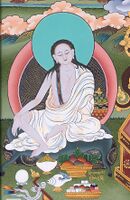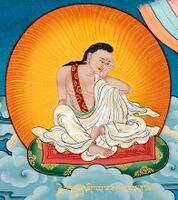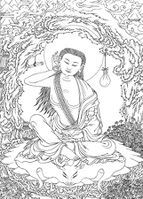Milarepa
| PersonType | Category:Classical Tibetan Authors |
|---|---|
| MainNamePhon | Milarepa |
| MainNameTib | མི་ལ་རས་པ་ |
| MainNameWylie | mi la ras pa |
| YearBirth | 1052 |
| YearDeath | 1135 |
| TibDateGender | Male |
| TibDateElement | Water |
| TibDateAnimal | Dragon |
| TibDateRabjung | 1 |
| ReligiousAffiliation | Kagyu |
| StudentOf | mar pa chos kyi blo gros |
| TeacherOf | sgam po pa · ras chung pa |
| BDRC | https://www.tbrc.org/#!rid=P1853 |
| Treasury of Lives | http://treasuryoflives.org/biographies/view/Milarepa/3178 |
| IsInGyatsa | No |
| BnwShortPersonBio | The most famous and beloved of Tibetan yogins. Although he is associated most closely with the Bka' brgyud sect of Tibetan Buddhism, he is revered throughout the Tibetan cultural domain for his perseverance through hardship, his ultimate attainment of buddhahood in one lifetime, and for his beautiful songs. The most famous account of his life (the Mi la ras pa'i rnam thar, or “The Life of Milarepa”) and collection of spiritual songs (Mi la'i mgur 'bum, or “The Hundred Thousand Songs of Milarepa”) are extremely popular throughout the Tibetan world. The themes associated with his life story—purification of past misdeeds, faith and devotion to the Guru, ardor in meditation and yogic practice, and the possibility of attaining buddhahood despite the sins of his youth—have inspired developments in Buddhist teaching and practice in Tibet. (Source: "Mi la ras pa." In The Princeton Dictionary of Buddhism, 541. Princeton University Press, 2014. http://www.jstor.org/stable/j.ctt46n41q.27.) |
| Other wikis |
If the page does not yet exist on the remote wiki, you can paste the tag |



